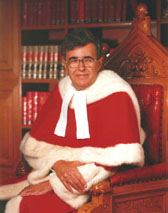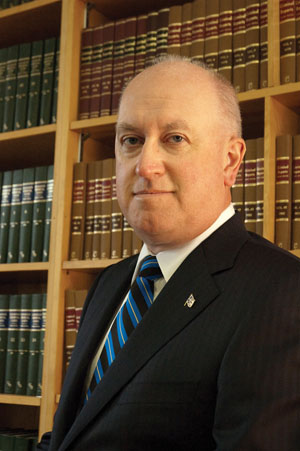Canadian Lawyer 4Students goes right to the top of the courts and gets some advice, tips, and trenchant thoughts from some of the most esteemed members of the bench in this country. We asked the judges to give us their two cents on the following penetrating questions:
1. If a law student wants to become a judge down the road, what’s the most important piece of advice you can give them?
2. What is the most common mistake you see lawyers make in the courtroom and how can it be avoided?
3. What’s the best thing about being a judge?
4. What was your favourite course in law school?
5. What movie(s) could you watch over and over?
 Justice Louis LeBel
Justice Louis LeBel, Supreme Court of Canada
1. Stop thinking about becoming a judge before leaving law school. Practise law for a while. Learn how the law works. Then, if you still think that you would like to become a judge, look deep into your inner self, ask yourself honestly whether you can really make decisions and live with their consequences. Judging is about deciding and being able to decide.
2. In appellate courts, the worst mistake is avoiding answering the question from the bench. Counsel must understand the weaknesses of their case and be prepared for the worst to answer these questions and engage with the court.
3. If I look back, I feel that the best thing is a hope of rendering a form of public service and, on occasion, of contributing to the development of the law.
4. My favourite course at Laval University law school was the general course on the law of civil obligations taught by professor Louis Marceau, who became dean of law and later a justice of the Federal Court of Appeal. Professor Marceau was simply a superb teacher who managed to give us some sense of the beauty of the law.
5. Jean Renoir’s
La Grande Illusion.
 Chief Judge D. Mark Pike
Chief Judge D. Mark Pike, Provincial Court of Newfoundland and Labrador
1. It is important to establish a reputation for being well-prepared, thoughtful, and polite not only to the judges before whom you appear but also among your colleagues and clients.
2. The most common mistake is lack of preparedness. It leads to many problems. Judges rely on counsel to ensure that all of the relevant facts and law are presented. Anything less can affect the outcome.
3. Like most positions of responsibility, being a judge provides an opportunity to make a positive difference in some way in the administration of justice. Discharging an important public duty is very challenging but it can also be rewarding.
4. My favourite course in law school at the University of British Columbia was the law of contracts. My professor was Beverley McLachlin, now chief justice of Canada. She was an excellent instructor.
5.
Casablanca (1942), starring Humphrey Bogart and Ingrid Bergman. It has nothing to do with law and is purely a matter of personal preference. It is such a wonderfully classic love story with so many memorable lines and characters, but never takes itself too seriously. A little humour is essential.
 Chief Justice Gerald Rip
Chief Justice Gerald Rip, Tax Court of Canada
1. Be civil in court; have respect of your colleagues.
2. Not being prepared and talking drivel in argument. Avoid this by knowing your case.
3. As a judge, you have the luxury of devoting your time to the law without the pressures of a law practice.
4. Obligations (or what common law would call “contracts”) was my favourite course in law school.
5.
The Guns of Navarone,
Dr. Strangelove,
West Side Story,
Some Like It Hot — these all show my age — and Coen Brothers movies and Christopher Guest movies.

 Justice Louis LeBel, Supreme Court of Canada
Justice Louis LeBel, Supreme Court of Canada Chief Judge D. Mark Pike, Provincial Court of Newfoundland and Labrador
Chief Judge D. Mark Pike, Provincial Court of Newfoundland and Labrador Chief Justice Gerald Rip, Tax Court of Canada
Chief Justice Gerald Rip, Tax Court of Canada